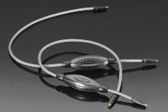
Poor cables won’t do justice to a high-end AV system, and may even contribute to it becoming damaged. Different purposes require different cables too – make sure you choose the right ones.

Deciding on how to link all your audio together may be a bigger issue than you think. Poorly cabled speakers can render your expensive high-end equipment defunct, and a bad wiring installation can also reduce the quality of your overall listening experience.
Sound quality aside, a proper installation will also ensure that you don’t have mounds of cable running around your room, creating a major eyesore or a trip hazard.
Types of cable
Power cables connect system components to the mains power. Some aftermarket power cables are noticeably better than others, but in terms of the effect they have on sound quality, power cables are probably the least significant cables in an audio system.
Digital cables are most commonly used for linking a DVD player and an AV receiver. These are becoming obsolete now that HDMI cables can transfer audio and video information digitally from the source to the amplifier, and from the amplifier to a video device.
The most significant cables in an AV system, from a sound perspective, are speaker cables and interconnects.
Speaker cables connect the amplifier to the speakers, and interconnects are used for connecting electronic components within your audio system, such as a CD player to an amplifier.
The cost of speaker cables can vary from practically nothing, to many thousands of dollars. Beware of cheap or ‘free’ interconnect cables, as they may give an inferior sound. They are typically thin, bright and brash. The sound of a modest system can be dramatically improved by changing the interconnect cables between CD player and amplifier. The resulting sound can be much smoother, richer and more involving.
What affects the quality of speaker cables?
There are many different marketing claims around speaker cables, and without addressing each one, it’s important to know that the length, the gauge and the shielding of the cable will make a difference above all else. A cable that’s too long will degrade the sound quality due to excessive resistance – and the same issue is true with a cable that’s too thin. The resistance of a cable affects what’s known as its capacitive and inductive reactance – which in turn has a direct affect on a speaker cable’s ability to faithfully transmit sounds of different frequencies.
How to find the right cable
One of the best ways to assess cables is to listen while they’re plugged in, preferably on a system similar to yours. Alternatively, audio dealers can usually advise on the most suitable cables for your system. Simply looking at specifications or the cable configuration gives little indication of their sonic quality.
All else being equal, a cable made from high-purity copper should sound better than one made from a lower grade. High-purity silver may sound better again, particularly in the treble, though at a much higher price.
It is usually preferable to use high-quality copper cables than similarly priced, and therefore lower quality, silver cables.





